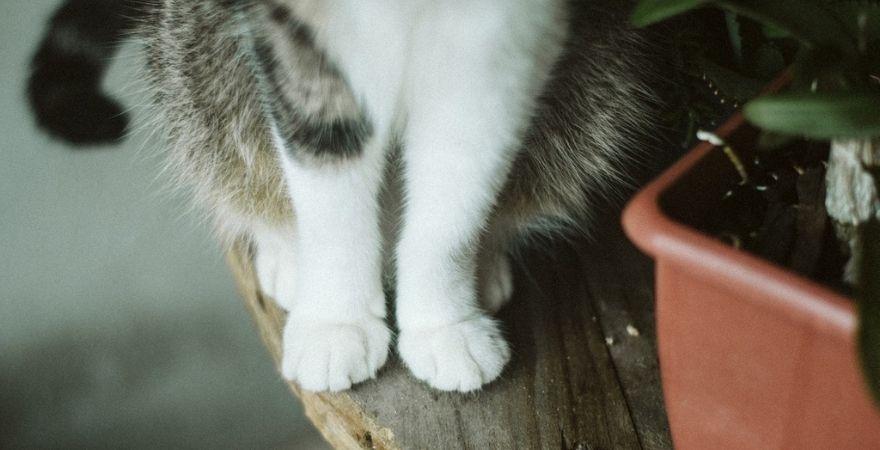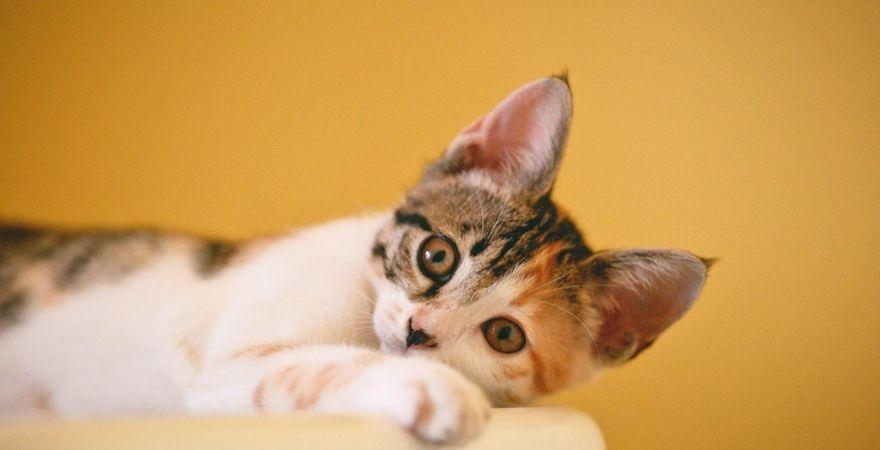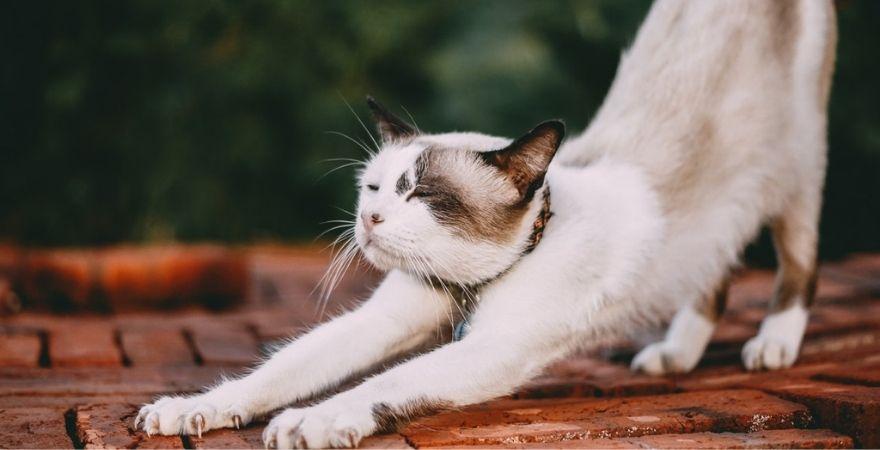This article is Part One of a two part series exploring urinary tract problems in cats. If you’ve had a cat in your life with urinary tract problems, you’ll know this already — but urinary problems can be a significant problem for our feline friends. These conditions can be painful, debilitating and, if not treated properly, even life-threatening.
But it’s not all bad news! Most urinary tract problems respond well to treatment. Provided you’re well-informed and committed to tackling the problem head on, there’s no reason your four-legged feline friend can’t be back on their feet and rearing to go in no time.
In this first article, we’ll look at the causes and symptoms of feline urinary tract problems. Reading this will give you a solid understanding of what to look out for when it comes to your cat’s urinary health. In the next article, we’ll dig deeper into your treatment and prevention options.

Facts About Urinary Tract Problems in Cats
First, here’s some terminology that’ll serve you in good stead. There are two broad categories of urinary tract problems which cover off the vast majority of urinary-related health complications your cat might experience:
1) Feline lower urinary tract disease (FLUTD)
2) Urinary tract infections (UTI)
FLUTD isn’t one condition. It’s a group of disorders affecting either a cat’s bladder or urethra. Your vet will usually diagnose this condition after ruling out other potential causes, like kidney stones or a UTI (more on that in a moment).
Because they may have a host of causes, FLUTD varies quite a lot in severity. While it can be life-threatening, the majority of cases can be managed effectively through lifestyle change and good veterinary care.
Urine is usually sterile, but a UTI occurs when bacteria travels up through the urethra and into the bladder. Life FLUTD, UTIs can vary in severity. Because they may be caused by any number of different kinds of bacteria, lab testing is usually required to identify the best course of treatment.
Unfortunately, most urinary problems are likely to come back in felines. While the research yields varying results, generally urinary problems are thought to recur in over 80 percent of felines. This means that once a urinary tract problem occurs, you’ll need to remain vigilant.
What Causes Urinary Tract Problems?
There are lots of potential causes. Stones, crystals or debris accumulation in the bladder are a likely culprit for FLUTD. Urinary stones are thought to be present in 10 to 20 percent of cats with FLUTD. A Common infection in the bladder is another likely cause, particularly for UTIs.
Not all causes, however, can be attributed to stones or infection. A significant number of cats experience urinary difficulties in response to stress or anxiety. A recent house move or a new pet in the house are two classic examples of external factors that might cause a cat to develop urinary problems.
Less common, although still quite prevalent, are problems with the spinal cord and a range of genetic abnormalities affecting urinary function.
What Does It Look Like?
FLUTD does not typically present in young cats, but its onset can occur well before old age. The average age for a cat to present FLUTD symptoms is at around 4 years of age. You’re more likely to see FLUTD in male cats. It’s also more prevalent among overweight cats that get limited exercise. Unusually, there’s also evidence that cats with limited or no interaction with an outdoor environment are more likely to develop FLUTD symptoms.
In the case of UTIs, female cats are more susceptible. It’s also more common among cats with diabetes. There’s a marked correlation of UTIs in cats with hyperthyroidism and chronic kidney disease, as well as cats that have received urogenital medical procedures in the past to deal with separate conditions.
Symptoms of urinary problems vary widely, but your cat may develop any of the following symptoms:
1- Bloody or cloudy urine
2- Urine of an unusual odor
3- Difficulty in using the litter box, or increased visits to the litter box
4- Finding new places to go to the bathroom (this is usually but not always stress related)
5- Increased drinking of water
6- Lethargy
7- Vomiting
8- A hard and/or distended (stretched taut) abdomen
In addition to these symptoms, it’s always a good idea to observe your cat for general levels of discomfort, excessive “self-soothing” grooming (particularly around the abdomen and genitals) and a sudden increase in irritability or anxiety. Any of these behaviors may point toward illness of some kind, including urinary tract problems.
Now you know the causes and symptoms for urinary tract problem in cats. In the next article we’ll get down to the nitty gritty of treatment, focusing on the medical, lifestyle and nutritional changes you can make to keep your best furry buddy healthy and happy.
One more thing...
If you are worried about UT infections in your kitty, or if you've had a cat thats been affected by them before we implore you to check out the Scruffy Paws UT Wellness Chews
Formulated by feline experts to the UT Wellness Chews specifically target the lining of your cats UT and Digestive tracts. Helping strengthen them and playing a hand in protecting them from crystals and debris in your cats urine. Not only that, the other active ingredients help reduce the 'bad bacteria' ability to stick to your cats UT wall... helping prevent FLUTD's in the first place!
Here's what one of our customers Sara said:
Good help for my male kitty who had blockage
I got these a little before release to test out on my male cat. He'd had a few FLUTD issues before, so I wanted to give him something that would help. So far, so good. He really likes eating these, and over the past few weeks he's been urinating well and not experiencing any pain.. so thumbs up from me.
==> If you want to support your cats UT health then click here
Sources
[Cat Urinary Tract Problems and Infections] (https://pets.webmd.com/cats/guide/cat-urinary-tract-problems#1)
[Cat Urinary Tract Infection Signs and Treatments | Hill's Pet] (https://www.hillspet.com/cat-care/healthcare/flutd)
[Urinary Tract Infections (UTIs) in Cats | VCA Animal Hospital] (https://vcahospitals.com/know-your-pet/urinary-tract-infections-utis-in-cats)
[Feline Lower Urinary Tract Disease | Cornell University College of Veterinary Medicine] (https://www.vet.cornell.edu/departments-centers-and-institutes/cornell-feline-health-center/health-information/feline-health-topics/feline-lower-urinary-tract-disease)
[Urinary tract infections in cats with hyperthyroidism, diabetes mellitus and chronic kidney disease. - PubMed - NCBI] (https://www.ncbi.nlm.nih.gov/pubmed/17088093)
[Clinical features and risk factors for development of urinary tract infections in cats. - PubMed - NCBI] (https://www.ncbi.nlm.nih.gov/pubmed/22710859)
[Antibiotics Aren't Always The Solution To Feline Urinary Woes] (hhttps://www.fearfreehappyhomes.com/antibiotics-arent-always-the-solution-to-feline-urinary-woes/)





10 comments
aGIsmvRWriUlVhYn
NZEUzGtF
uRoYHrEy